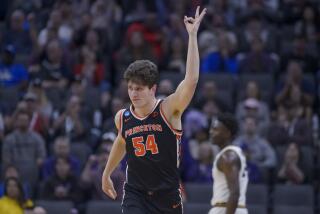Princely Manner Wins
- Share via
To appreciate what an accomplishment Air Force’s 14-2 record is, consider that Air Force has hardly been able to get off the ground for the last 25 seasons.
The Falcons’ last winning season was 1977-78.
Their only NCAA tournament appearances were in 1960 and ’62.
Now Air Force is running Princeton’s famous back-door cuts all the way to the top of the Mountain West Conference standings and is receiving votes in both top-25 polls.
Exactly what a feat that is at a military service academy these days was hinted at when Army and Navy played Friday. Army had won four games, and Navy, once famous for producing David Robinson, had won three.
Air Force has beaten California on the road, something neither UCLA nor USC was able to do, and is coming off a 22-point victory over Brigham Young and a 13-point victory over Utah going into a game at San Diego State tonight.
“Our guys know nobody is going to the NCAA tournament after 16 games,” said fourth-year Coach Joe Scott, who played for Pete Carril at Princeton in the 1980s and was an assistant to Bill Carmody on the 1997-98 Princeton team that was ranked in the top 10. “All our guys know we’ve got to get ready to play San Diego State or we’ll lose by 20.
“I know they’re not walking the halls between class with people slapping their backs. People don’t care. It was the same way at Princeton. Nobody cares. That doesn’t mean they don’t come to the games, they do. But it’s a different environment. It keeps you grounded.”
It’s the sort of place where a basketball player can see his life transformed.
A.J. Kuhle, a 6-foot-3 senior forward from Concord De La Salle High who turned down a chance to walk on at Cal, has decided to become an Air Force pilot.
“I got an F-16 ride last May,” he said. “It was one of the greatest experiences of my life. It was an amazing feeling, going .98 Mach -- about 500 or 600 miles per hour -- and pulling Gs, the pressure forces you feel.”
Kuhle’s uncorrected vision would have disqualified him, but he underwent laser surgery that improved his sight from 20/400 to 20/20, helping him earn a pilot’s spot.
Kuhle is just one example of the sort of player Scott recruits. He wants guys who have won before, such as Kuhle, who played on De La Salle’s 31-1 state championship team his senior season.
Scott can’t get the best players off those teams, but he can get the fourth or fifth man, a player who is fundamentally sound and, most important, can qualify for admission. (Most players spend a year at the Air Force Academy Prep School as a transition.)
Matt McCraw, a freshman from Lakewood Mayfair High who played with Stanford’s Josh Childress for three seasons, is another example of a player from a winning background.
“The academics had a lot to do with [choosing Air Force],” said McCraw, who has been a big three-point threat off the bench for the Falcons.
Another reason he picked Air Force was a loss to Palm Desert in his last high school game.
“They ran the Princeton offense,” he said. “I was pretty mad about that loss, but I found out Air Force was going to run it and I knew how frustrating it was to try to stop.
“You have so many players who can score so many different ways, and right when the defense makes one slip-up or doesn’t play defense that extra second, you get a layup.”
The Princeton system is notoriously difficult to learn, but this group of players seems to have it down in Scott’s fourth season.
At the same time Scott was installing the offense, built on precise passing, cutting and shooting, he also was working to upgrade the talent, and Air Force has gone from eight wins in his first season to nine his second, then 12, and now this breakthrough season.
“No system wins games,” Scott said. “At Princeton, we had very good players.”
Tim Keller, a junior guard, and sophomore guard Antoine Hood are the leading scorers for Air Force, but the centerpiece is 6-8 sophomore Nick Welch, who plays a key passing role in the offense and is versatile enough to go to the basket or shoot the three.
Seven players, including all five starters, are legitimate three-point threats. A total of 12 have made at least one three.
The Princeton system not only produces high-percentage shots -- Air Force shoots better than 50% -- but long and usually successful possessions as well, tending to make each possession for the other team more crucial.
So besides being a very efficient offensive team, Air Force also leads the nation in scoring defense, giving up a mere 47.1 points a game.
It could all come tumbling down, and Air Force still has a ways to go to feel confident of an NCAA tournament bid.
The Falcons’ only losses were to Belmont, a team that upset Missouri, and Auburn.
“When I was thinking about the job, my buddy was saying, ‘It’s the worst job in the country. You can’t win there. It’s a graveyard for basketball coaches,’ ” Scott said.
Maybe his team will make the NCAA tournament, maybe not.
But the first winning season for Air Force in these players’ lifetimes looks like a layup from here.
*
(BEGIN TEXT OF INFOBOX)
Taking Wing
Air Force’s resurgence this season is all the more stunning in contrast to its consistently poor record over the past four decades. Since qualifying for the 1962 NCAA tournament, the Falcons have only had five winning seasons, the last in 1977-78. A look at Air Force’s average record over the ensuing decades, and its improvement under Coach Joe Scott:
*--* Average Seasons Wins Losses 1962-63 through 1969-70 10.3 13.5 1970-71 through 1979-80 12.4 12.7 1980-81 through 1989-90 10.3 17.7 1990-91 through 1999-2000 8.3 19.1
*--*
UNDER JOE SCOTT
*--* Overall Conf. Season W-L W-L 2000-01 8-21 3-11 2001-02 9-19 3-11 2002-03 12-16 3-11 2003-04 14-2 4-0
*--*
More to Read
Go beyond the scoreboard
Get the latest on L.A.'s teams in the daily Sports Report newsletter.
You may occasionally receive promotional content from the Los Angeles Times.










